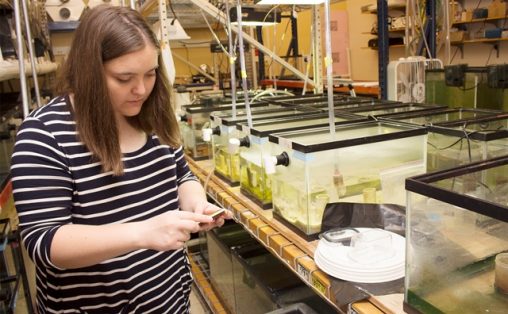
Ashlea Kennedy, an undergraduate Applying Scientific Knowledge research student at Wright State, works in the aquarium room. The College of Science and Mathematics received a $1 million grant to expand the research program. (Contributed photos)
The National Science Foundation has issued a $1 million award that promises to expand and further diversify undergraduate research in Wright State University’s College of Science and Mathematics.
The five-year, $997,589 award will fund scholarships, programming and research activities for the Applying Scientific Knowledge (ASK) program. The award, which was announced March 8, will run through February 2023.
“The idea is to increase retention, academic success and work/career advancement with the notion of providing students who have financial need with scholarships to perform in the sciences,” said Jason Deibel, chair of the Department of Physics and who helped direct efforts to win the grant.
The ASK program at CoSM began in the fall of 2016, with about 10 students going through the program each year. A few have received summer fellowships, but no scholarships were available.
“I think the scholarships are going to attract a larger amount of students to the program,” said Deibel. “And it’s going to give a lot more attention to the program.”
Of the nearly $1 million, $630,000 will be allotted for scholarships. That is expected to fund 42 students with annual scholarships of up to $5,000 apiece. Each year for three years, 14 students will receive scholarships. And five of the students will have the opportunity to have a paid summer research experience from the fund.

Applying Scientific Knowledge student Dorothy Ayres, right, records measurements of eye movement in a study of attentional blink.
Efforts to win the award for the ASK program had been underway for three years.
“I wanted to get long-term funding for this, or at least something where we got an injection of funds where we could really ramp it up,” said Deibel. “The idea of injecting scholarship money into this was something we wanted to do.”
“This award is a wonderful success that supports and advances the college’s strategic goal of providing experiential learning opportunities for every student that comes to the college,” wrote Douglas Leaman, dean of the College of Science and Mathematics.
“Experiential learning can include undergraduate research, internships or co-ops, job shadowing, field work or study abroad, but undergraduate research has always been the cornerstone of experiential learning in the college. This funding enables the ASK program to engage more students in undergraduate research as we focus on expanding opportunities in other experiential areas.”
The traditional model of undergraduate research has students being mentored individually by a faculty researcher, which can be an expensive and inefficient method and is often a tough sell to awarding agencies.
Under the ASK model, undergraduate students first take a research-methods course and then do research in teams. Each student takes part for three semesters.
“How can you get the undergraduate research experience to as many students as possible?” said Deibel. “A program like this expands that ability by doing it through team-based undergraduate research. The previous model was one student at a time to go work with this faculty member. We know this will have a good impact.”
Meredith Rodgers, director of ASK, recruits students to the program, organizes research projects and finds research opportunities.
Previous and current research projects in the ASK program have involved the study of binary star systems, the use of gold nanoparticles in anti-cancer treatments, physiological responses, imaging using terahertz technology, environmental issues and other topics.
Rodgers said undergraduate research teaches students “incredible critical-thinking skills.”
“A lot of research is thinking on your feet and having to figure out how to fix a problem right then and there,” she said. “Experiential learning opportunities and teamwork in the laboratory help students develop skills that they can utilize in their coursework and their future careers.”
Rodgers said undergraduate research also gives students a good idea of the kind of research going on in their field of study and helps them figure out their career path early on.
Adrienne Traxler, assistant physics professor, will be assessing the educational impact of the scholarship-fueled ASK program.
Traxler plans to interview the students to find out how the program helped develop them as researchers, whether they became more socially embedded in the campus STEM community, and how they begin to talk about their research in more scientific language. She will also assess the students’ academic performance.
Traxler said the grant will “open the door” for many students who might not have previously seen themselves as scientists.
“Science is a better enterprise when it is done by a group of people that reflects the diversity and richness of humanity,” Traxler said. “It is more intellectually rigorous, more active, a more just and compassionate enterprise the more kinds of people there are doing it.”

 Wright State names Rajneesh Suri dean of Raj Soin College of Business
Wright State names Rajneesh Suri dean of Raj Soin College of Business  ‘Only in New York,’ born at Wright State
‘Only in New York,’ born at Wright State  Wright State president, Horizon League leaders welcome new commissioner
Wright State president, Horizon League leaders welcome new commissioner  Wright State celebrates homecoming with week-long block party
Wright State celebrates homecoming with week-long block party  Wright State baseball to take on Dayton Flyers at Day Air Ballpark April 15
Wright State baseball to take on Dayton Flyers at Day Air Ballpark April 15 